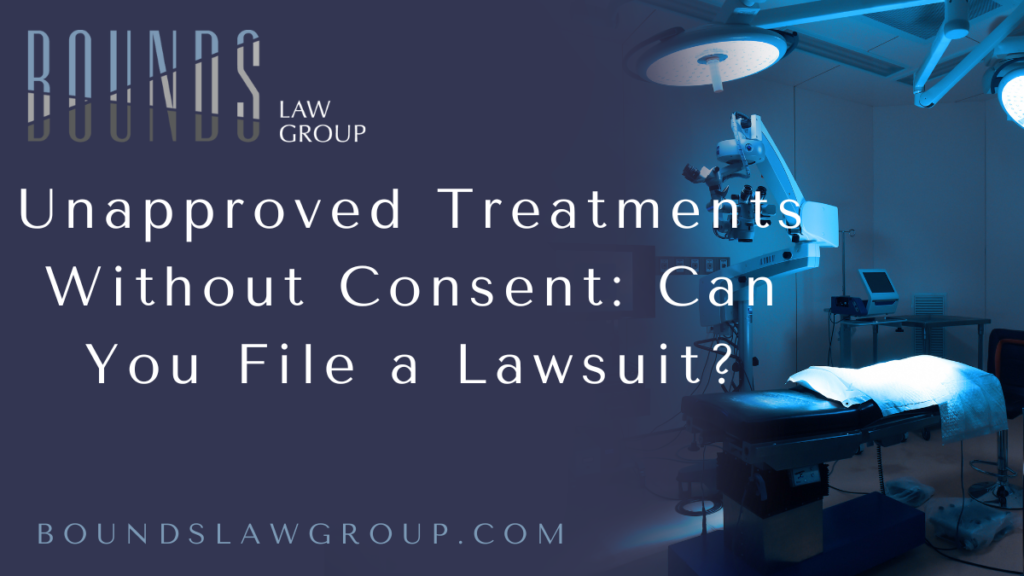
Unapproved Medical Treatment | Bounds Law Group
When it comes to medical treatment, your right to make informed decisions about your health is fundamental. However, there are instances when healthcare providers administer treatment without obtaining proper consent, leaving patients vulnerable to harm. If you or a loved one has experienced unauthorized medical treatment, you may be entitled to take legal action. Filing an unauthorized medical treatment lawsuit can help you seek justice and hold negligent healthcare providers accountable for their actions. At Bounds Law Group, we are dedicated to protecting your rights and guiding you through the legal process to secure the compensation you deserve.
Contact us now at 877-644-5122 or complete the free case evaluation form for expert legal assistance.
What Is Unauthorized Medical Treatment?
Unauthorized medical treatment occurs when a healthcare professional performs a procedure, surgery, or administers medication without first obtaining informed consent from the patient or their legally designated representative. This can include:
- Performing surgeries not agreed upon.
- Administering treatments beyond the scope of the signed consent.
- Ignoring a do-not-resuscitate (DNR) order.
- Altering treatment plans without informing the patient.
Such actions are not only unethical but may constitute medical battery, a serious legal offense that can be pursued through a unauthorized medical treatment lawsuit.

Informed Consent: The Legal and Ethical Standard
Informed consent is a foundational principle in healthcare. Before any non-emergency treatment, physicians are legally required to:
- Explain the nature of the procedure.
- Discuss potential risks and benefits.
- Offer alternative treatments.
- Obtain voluntary agreement from the patient.
Without this process, any medical action taken may be considered unauthorized, giving the patient legal grounds to file a unauthorized medical treatment lawsuit. If you were treated without understanding or approval, you may have been a victim of this violation.
Examples of Cases That May Warrant a Lawsuit
You might be eligible to file a unauthorized medical treatment lawsuit if you’ve experienced situations such as:
- A surgeon removing an organ you did not consent to during a procedure.
- A doctor prescribing or administering medication you did not authorize.
- Medical staff performing procedures after you explicitly declined them.
- Treatment administered to a minor without parental or guardian consent.
- Alterations to a signed treatment plan without notice or agreement.
These scenarios can lead to physical, emotional, and financial harm—consequences you should not bear alone.
Legal Grounds for Filing an Unauthorized Medical Treatment Lawsuit
An unauthorized medical treatment lawsuit typically rests on one or more of the following legal foundations:
Medical Battery
Medical battery is the unauthorized physical contact between a physician and a patient. Unlike medical malpractice, which is based on negligence, medical battery is intentional and does not require proof of harm—only that consent was not obtained.
Medical Malpractice
If the unauthorized treatment results in injury or worsening health, medical malpractice laws may apply. This requires showing that the medical provider deviated from standard practices and caused you harm.
Violation of Patient Rights
Every patient has the right to make informed decisions about their body. Ignoring this right can trigger civil liability. Courts take these violations seriously, especially when they involve vulnerable populations such as the elderly, mentally impaired, or minors.
What Damages Can You Recover?
If your lawsuit is successful, Bounds Law Group can help you pursue compensation for:
- Medical expenses (including corrective procedures)
- Pain and suffering
- Emotional distress
- Loss of income or earning capacity
- Punitive damages (in egregious cases)
Every case is unique, and the extent of recoverable damages depends on your individual circumstances and the harm suffered.
How Bounds Law Group Can Help You
At Bounds Law Group, we have deep experience in handling unauthorized medical treatment lawsuits. Our legal team understands the complexity of these claims and the sensitivity surrounding them. When you work with us, you gain:
- Aggressive legal representation
- Detailed case evaluation and investigation
- Access to medical experts
- Proven litigation strategies
Our mission is to hold negligent medical providers accountable and secure the justice you deserve.
What to Do If You’ve Received Unauthorized Treatment
If you believe you were subjected to unauthorized medical care, take the following steps immediately:
- Request a full copy of your medical records.
- Document everything you remember about the incident.
- Seek a second opinion from a trusted medical provider.
- Do not sign any waivers or releases given by the hospital or clinic.
- Contact Bounds Law Group to discuss your case.
We are here to support and guide you through every step of the legal process.
Statute of Limitations for Filing a Lawsuit
Each state imposes time limits for filing medical lawsuits, known as the statute of limitations. In many jurisdictions, you must file your claim within two years from the date you discovered or reasonably should have discovered the unauthorized treatment. Failure to act within this timeframe may result in losing your right to compensation.

Can a Family Member Sue on Behalf of a Patient?
In many unauthorized medical treatment lawsuit cases, the victim may be incapacitated, deceased, or otherwise unable to initiate legal proceedings themselves. In these instances, a family member or legal representative may have the right to file a lawsuit on their behalf. This is particularly common in cases involving:
- Minors, where parents or legal guardians must give consent for treatment.
- Elderly patients with dementia or cognitive impairments.
- Unconscious or critically ill individuals who were unable to give informed consent at the time of treatment.
- Deceased patients, where surviving family members may pursue a wrongful death claim if unauthorized treatment contributed to their death.
Legal standing in such cases typically requires proof of a close relationship (such as spouse, parent, or legal guardian) and/or legal authority (such as a power of attorney or healthcare proxy). At Bounds Law Group, we assist families in understanding their rights and taking swift action to hold negligent providers accountable when a loved one’s autonomy was violated.
If you're uncertain whether you can sue on behalf of a loved one, don’t hesitate to complete our free case evaluation form or call us now at 877-644-5122. Our legal team will guide you through your options with clarity and compassion.
Don’t Wait—Protect Your Rights Today
Unauthorized medical treatments are not minor missteps—they are serious violations of your legal rights. If you or a loved one has been impacted by such an event, do not delay.
Complete our free case evaluation form or call us now at 877-644-5122 to speak with an experienced attorney at Bounds Law Group.
We are ready to stand by your side and fight for the justice and compensation you deserve.
Sources
- American Medical Association (AMA): Informed Consent Guidelines
Provides a comprehensive outline of legal and ethical standards for obtaining informed consent in medical settings.
https://www.ama-assn.org - National Institutes of Health (NIH): Patient Rights and Medical Consent
Detailed research and case studies on patient rights regarding treatment authorization and consent.
https://www.nih.gov - Cornell Law School Legal Information Institute: Medical Battery
Legal definitions, case precedents, and distinctions between malpractice and medical battery.
https://www.law.cornell.edu

